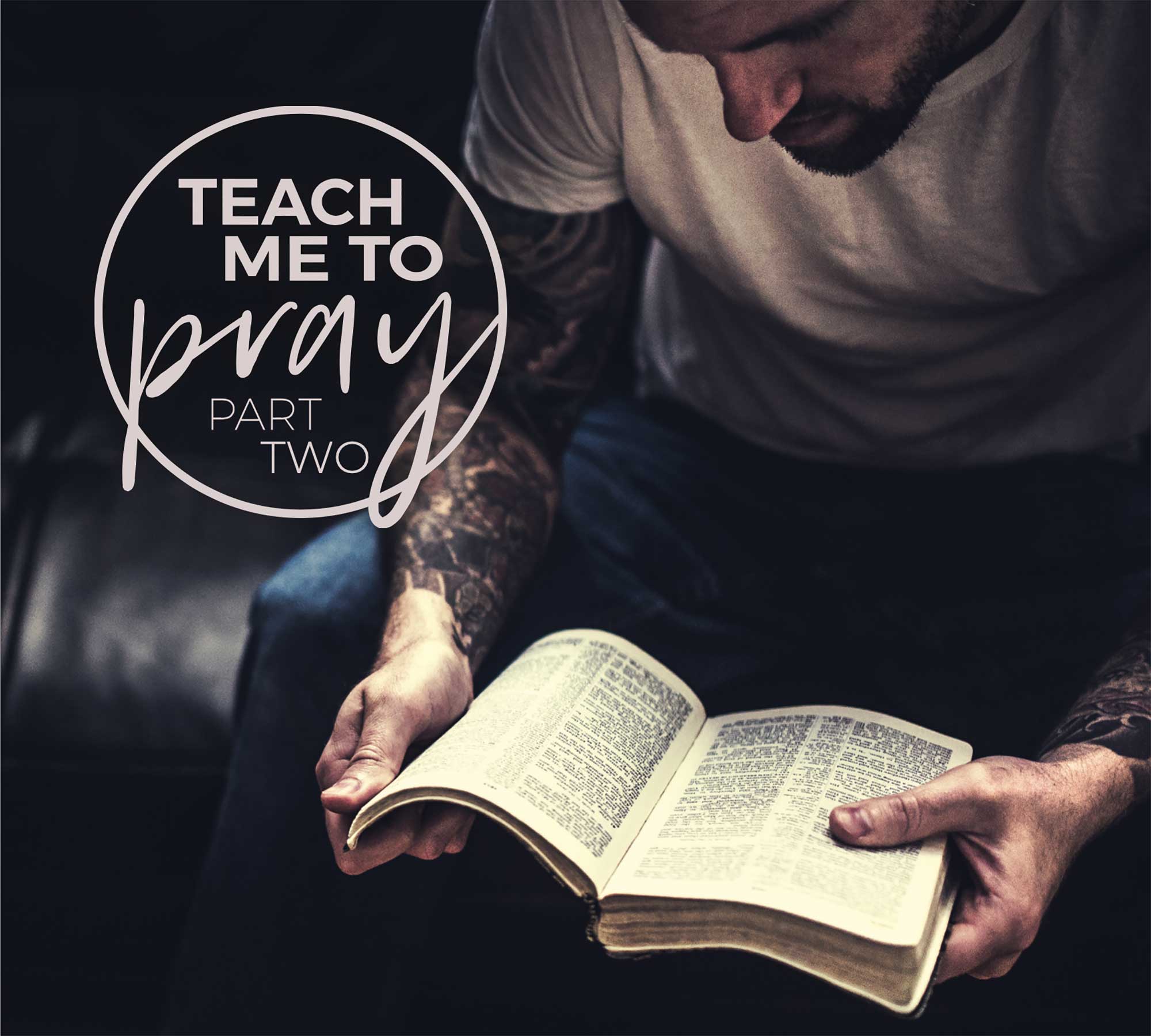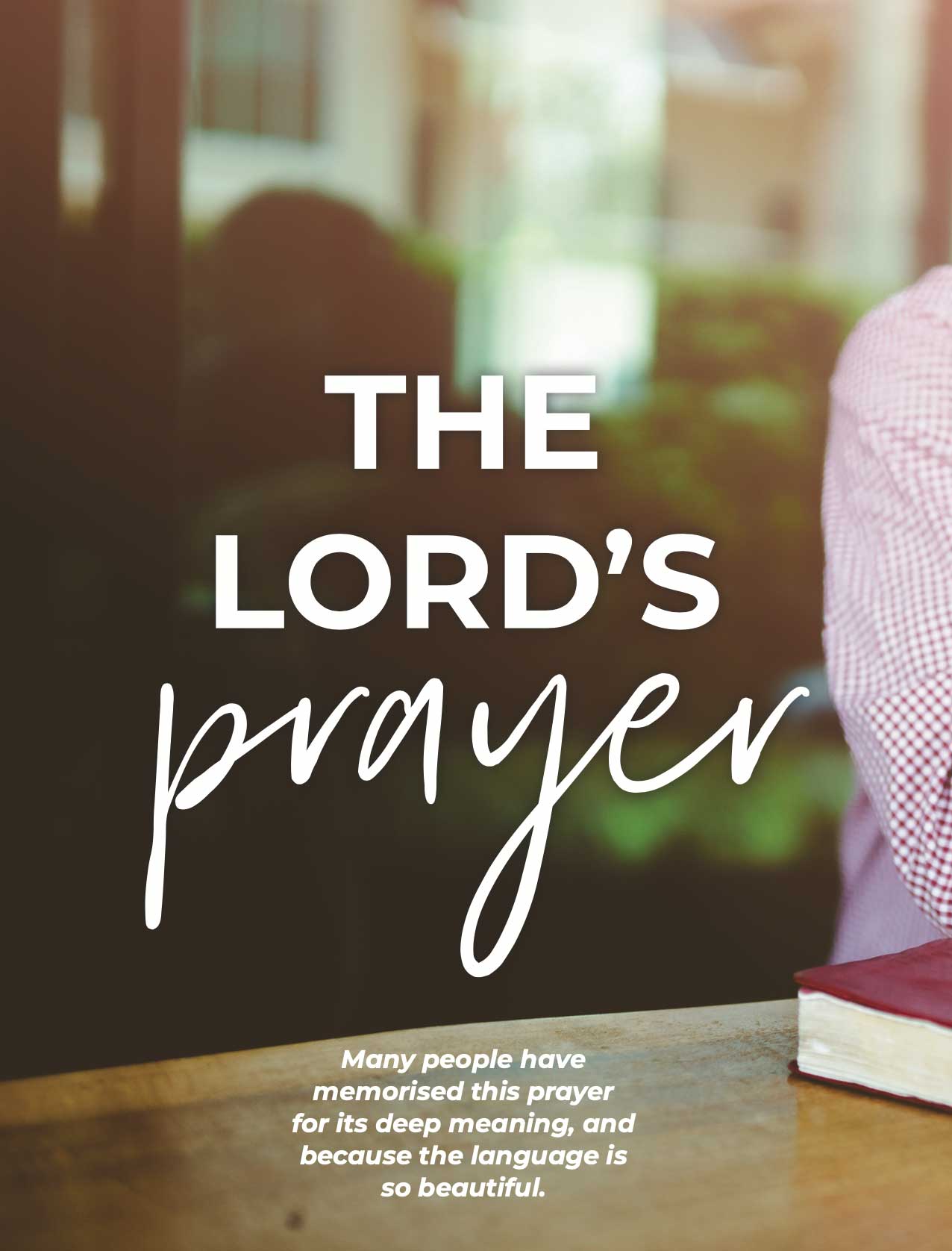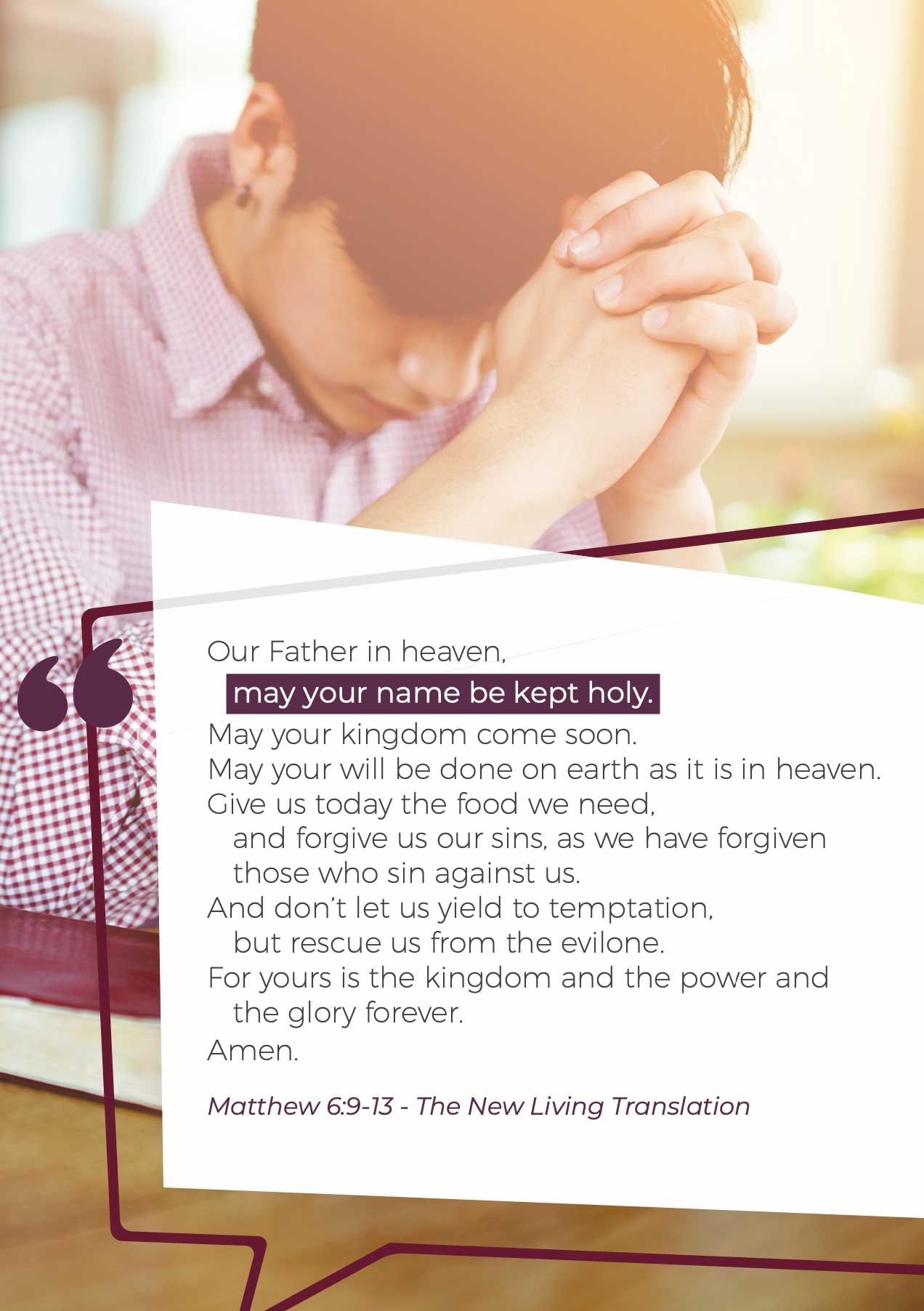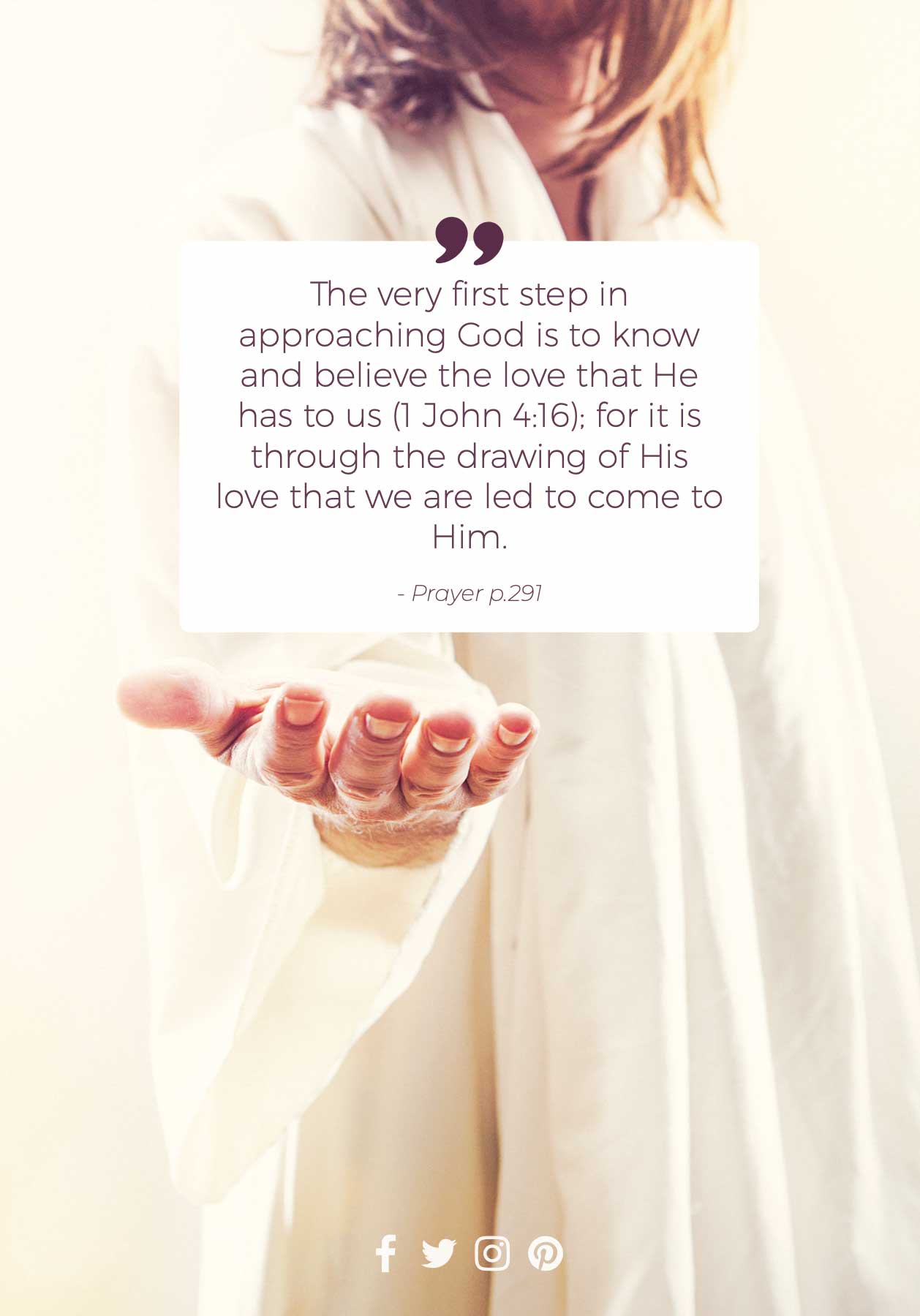
Please Show Me

One day Jesus’ followers asked him to teach them how to pray.
He taught them what is known as the Lord’s Prayer.
It’s recorded in slightly different ways in two places in the Bible –
firstly in Matthew 6:9-13, for Christians who had a Jewish background –
secondly, in Luke 11:2-4, for Christians from a non-Jewish background.
GET INVOLVED –
Jot down three things that come to mind when you read the Lord’s Prayer.

MY STORY

Many people have memorised this prayer for its deep meaning, and because the language is so beautiful.
Jesus did not intend us to recite the actual words formally in a manner similar to an empty ritual or mantra.
He desired us to use his prayer as a model for our own unique prayers.
Rather than testing our ability to memorise the words, he longs for us to grasp their meaning.


ASPECTS OF THE LORD’S PRAYER
Before we begin our journey through the different parts of the Lord’s Prayer in detail, it will be helpful to look at some things that stand out.
1. IT DOESN’T WASTE WORDS
The first obvious thing we notice is its length.
In contrast to the wordy prayers of many people in Jesus’ day, it is short and to the point.
But this should not fool us. Whilst being economical with words, Jesus is really saying – These are only a suggested list of headings I want you to use in your prayers.
You fill in the details that are meaningful for you! It is easy to pray the Lord’s Prayer mechanically; and indeed some do.
As we talk to him, he wants us to take time to develop each of its principles as they relate to us individually.

2. IT HAS PRIORITIES
The next thing to note is the order of requests in the prayer.
Jesus shows what is most important to God and where we should start.
Only then does he outline other specific things he wants us to pray about.
A closer look shows that there are six requests or petitions in this model prayer.
The first three parts of the prayer focus on different aspects of the immense size of God and his position.
He begins by asking us to consider what his name means.
Then he tells us that he has a kingdom, and asks us to pray that this kingdom would become more and more a reality here on earth and in our personal lives.
Then he calls on us to pray that we carry out his will in every part of our lives in just the same way that it is now being done in the rest of the universe.
The first three requests are spiritual in nature.
The final three requests focus on our basic needs as human beings.
The first priority, summarised as bread, is a concern for everything that sustains our physical life.
The second deals with preserving our relationships with God and other people.
We need to receive forgiveness from him, and as a result grant it to others.
And the last is to call on God to help us spiritually.
We need his protection from temptation and the evil one.


3. IT IS SIMILAR TO THE TEN COMMANDMENTS
There is a remarkable similarity between the Lord’s Prayer and the Ten Commandments. (See Exodus 20:1-17)
God gave the human race the Ten Commandments as a way to live, and as boundaries for our happiness.
There is a similar pattern in each of these important passages in the Bible.
The emphasis in both puts God first and us second.
The reason for this is that we can only live happily and pray meaningfully if we first of all know who God is and what he has done for us.
Our image of who God is and what he is like is the one thing that determines how we will speak to him.
It’s so important to get this right.
It will shape the way you pray.


The perception of God’s love works the renunciation of selfishness. In calling God our Father, we recognise all His children as our brethren.
– Mount of Blessing p.105
DEVELOPING A RECEPTIVE HEART FOR PRAYER
Most people when they pray will talk to God about the things they need; very much like a shopping list.
A similar thing happens when we are under great stress.
Often our emotions overwhelm us and, without thinking, we pour out to him everything in our lives that is going wrong.
Fortunately he understands us well, and doesn’t turn away from our prayers, even if they are self-centred.
But our times with God, and the requests we bring to him, will be much more meaningful if we firstly stop and remind ourselves just who it is we are addressing.
It is for this reason that the Lord’s Prayer focuses initially on God, and then on our needs.
BEING REFLECTIVE –
Prayer can be understood better when we reflect on the relationship that humans had with God in the beginning.
In Genesis 1 and 2 we have the story of how God created this world and our first parents. Genesis 3:8 says –
Then the man and his wife [Adam and Eve] heard the sound of the LORD God as he was walking in the garden in the cool of the day…
…then there was face-to-face conversation between God and Adam and Eve.
The story tells us that Adam and Eve broke their trust in God by disobeying him and eating the forbidden fruit.
Mankind lost the privilege of face-to-face conversation with God.
That loss is called The Fall.
But God did not reject mankind then.
The face-to-face relationship with God was broken, but they could still connect with God, though he was now unseen.
That connection is based on trust again.
That is one good reason why we start our prayer the way Jesus taught us.
We acknowledge him as God our Father, and though unseen we trust him.
He is holy and we desire to do his will – not ours like in The Fall.

We gain confidence in His incredible power to look after and protect our lives.
In this way of praying, Jesus is teaching us to value the special relationship and intimacy he shared with God.
The first half of the Lord’s Prayer creates a similar attitude in our own hearts and makes our prayers to become meaningful and effective.
This attitude helps us focus on the very presence of God, as he surrounds us and offers his guidance and protection.
Praying in this way, with an initial focus on God, brings about a healthy perspective.
Without being consciously aware of it, we position ourselves in a place where we can fully trust God to answer our prayers.
Since Jesus portrays God as our Father, we can catch a glimpse of his heart and love for us.
He is also the great King of the universe and Sovereign over all, and we gain confidence in his incredible power to look after and protect our lives.
REALITY CHECK –
Since The Fall, insecurity has threatened people.
Because we forfeited our spiritual connection with God, we humans naturally try to find security in physical and material things.
The more we have, the more secure we think we will be.
Wrong! Even though we live in a fallen world God still provides for our physical needs, whether we love and accept him or whether we reject him.
He causes his sun to rise on the evil and the good, and sends rain on the righteous and the unrighteous. Matthew 5:45
Our greatest need is spiritual – to regain that personal connection with God that was lost in The Fall – and the good news is we can!
You will seek me and find me when you seek me with all your heart. Jeremiah 29:13
Jesus echoes this same promise –
But seek first his kingdom and his righteousness, and all these things will be given to you as well. Matthew 6:33
Seek the spiritual – put God first – and he will supply the physical things as well.
That is real security.
This is a better way to proceed in our spiritual journey, instead of focusing on our needs, or our little kingdoms, and our self-centred desires.
To see God as he really is makes us become more aware of his abundant generosity and his deep desire to supply our needs.
He delights in meeting our needs, but he is reminding us that they are not something we can demand as our right.
He is also showing us that he is the only one who can supply them.

The reality of the matter is that we are dependent on him – not as servants of a hard taskmaster, but as children in relationship with their father.
ASK YOURSELF –
This may be the most helpful question you ever ask yourself
Why am I doing this Teach Me to Pray course?
What is my motive?
Is your heart open and receptive to talk to God today?
Are you hungry for God?
If not, take some time to ask him to grant you a sense of his presence in your life.
Who do we pray to?

WHO DO WE PRAY TO?
The Lord’s Prayer could only have been given to us from someone who understands us deeply.
As you reflect on it in more detail in the following booklets, and use it as the framework for your relationship with God, you will see more and more how all-inclusive it is – both in its grasp of who God is, and how he feels about you.
It deals with all your needs, covering all aspects of your being – physical, psychological and spiritual.
It also opens your eyes to the amazing reality that God is on your side.
His passion for talking with you in an intimate way is something that will gradually capture your heart.
The Bible says that Jesus –
Who, being in very nature God, did not consider equality with God something to be grasped, but made himself nothing, taking the very nature of a servant, being made in human likeness. Philippians 2:6-7
Because he is fully God and fully man, it qualifies him to be the one mediator between God and you. (See 1 Timothy 2:5)
A mediator is someone who is a go-between between two people. That’s what he does with our prayers to God the Father.
For this reason, it is perfectly right to pray to Jesus when you want to thank him for all he has done for you.
It is also important to note that just before he left Earth, Jesus said to his followers –
I will ask the Father, and he will give you another Counselor to be with you forever—the [Holy] Spirit of truth.
The world cannot accept him, because it neither sees him nor knows him. But you know him, for he lives with you and will be in you.
John 14:16-17
Because the Holy Spirit is also God, it is equally important to talk to him too.
In fact, sometimes when you don’t know what to pray for, the Bible says that he will pray for you.
In the same way, the Spirit helps us in our weakness.
We do not know what we ought to pray for, but the Spirit himself intercedes for us with groans that words cannot express.
And he who searches our hearts knows the mind of the Spirit, because the Spirit intercedes for the saints (all of God’s followers) in accordance with God’s will. Romans 8:26-27

ENCOURAGEMENT FOR THE JOURNEY
Whether you are a Christian or not, God loves you.
That is the good news.
He made us all.
We are all part of this fallen world and in a fallen condition.
We all need God.
The message of the Bible is God speaking to everyone.
Prayer is the privilege he gives to all of us to connect with him again.
We encourage you to press on and discover what Jesus has to say that is meaningful for all cultures and all spiritual backgrounds.
God has put a longing for eternity in the heart of all of us.
That’s what has motivated all people, in all times, to reach out to someone bigger than themselves.
Our human spirit will always try to reach out and connect with either someone or something outside ourselves to fill an inner longing.
Jesus has much to say to us about our human existence and being connected to God.
This course will get you started – or help you if you have started – to connect with God in a way that will satisfy.
This lesson has been a general introduction and overview of the Lord’s Prayer.
For the remainder of this course you will study each part of this prayer in greater detail, and see how it relates to your life.
Remember that when Jesus’ disciples asked him to teach them how to pray, this prayer was his answer.
GET INVOLVED –
Share with God just one spiritual need that comes to your mind right now.

Prayer is the privilege he gives to all of us to connect with him again.
